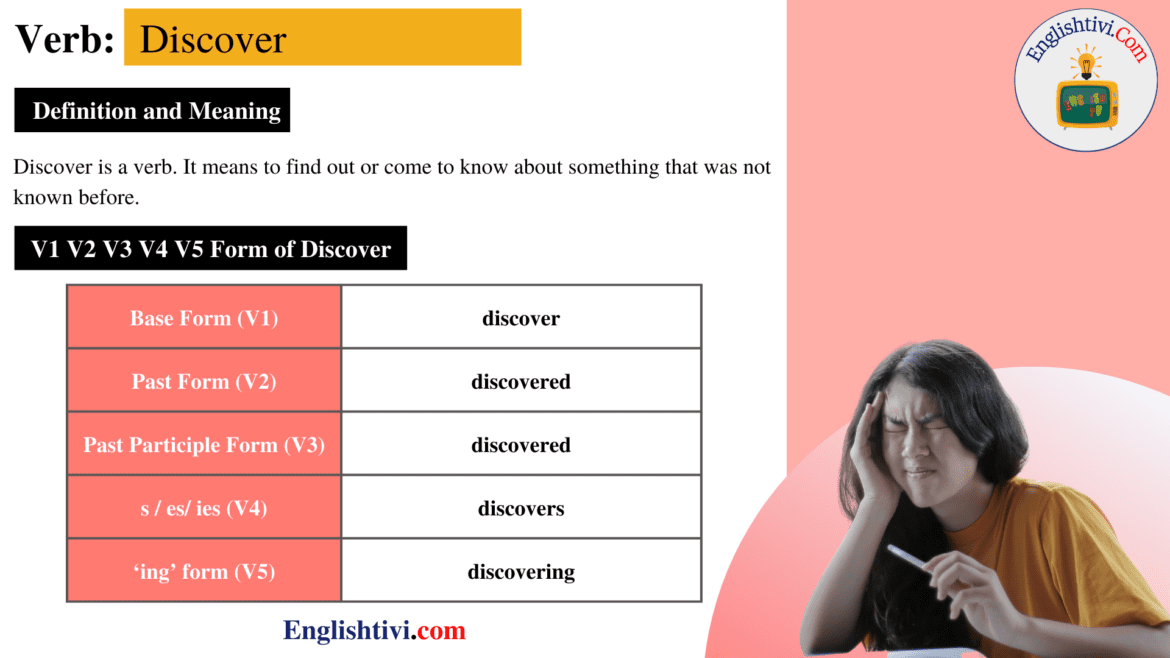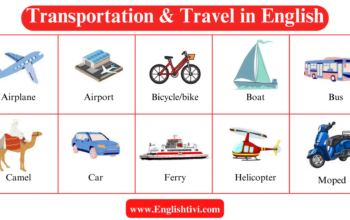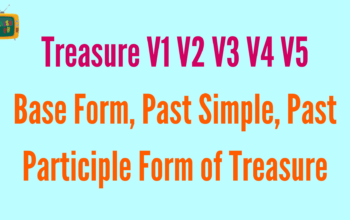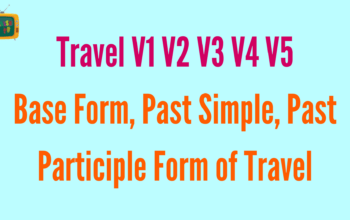Discover V1 V2 V3 V4 V5 is one of the verbs that are used very commonly in English tests as well as in everyday communication. Also, because it’s an irregular verb, discover doesn’t follow the regular rule. The verb “discover” has five different forms: base form, past simple, past participle form, present perfect, and present perfect participle. So what is discover‘s past? How do conjugate verbs with discover verbs?
⏩ Sign Up to Get Bonus
Let’s find out with English tivi in the article below.
See more at: Verb
Discover of Definition and Meaning
Discover is a verb. It means to find out or come to know about something that was not known before.
V1 V2 V3 V4 V5 Form of Discover
| Base Form (V1) | discover |
| Past Form (V2) | discovered |
| Past Participle Form (V3) | discovered |
| s / es/ es (V4) | discovers |
| ‘ing’ form (V5) | discovering |
Discover of Past Simple V2
The verb Discover is also employed in its V2 form as “discovered”’. It is used to indicate the past tense in sentences.
Discover of Past Participle V3
The V3 form is identical to the V2 form. The V3 form is “discovered”. Discovered is used in the past or present perfect tense.
+ In the present perfect tense, we use the word V1 as ‘have + discovered‘ or ‘has + discovered'.
- I, you, and we are used as ‘have + discovered‘.
- ‘has + discovered' is used for he, she, and it.
+ If you need to use the past perfect tense, use ‘had + discovered‘ regardless of the subject.
You might also like: ALL the English Grammar Basics You Need
Conjugation of Discover V1 V2 V3 V4 V5
Conjugation table: discover | |||
| Number | Singular | ||
| Present Simple of discover | I | You | She/He/It |
| discover | discover | discovers | |
| Plural | |||
| We | You | They | |
| discover | discover | discover | |
| Present Continuous of discover | I | You | She/He/It |
| am discovering | are discovering | is discovering | |
| Plural | |||
| We | You | They | |
| are discovering | are discovering | are discovering | |
| Present Perfect of discover | I | You | She/He/It |
| have discovered | have discovered | has discovered | |
| Plural | |||
| We | You | They | |
| have discovered | have discovered | have discovered | |
| Present Perfect Continuous of discover | I | You | She/He/It |
| have been discovering | have been discovering | has been discovering | |
| Plural | |||
| We | You | They | |
| have been discovering | have been discovering | have been discovering | |
| Past Simple of discover | I | You | She/He/It |
| discovered | discovered | discovered | |
| Plural | |||
| We | You | They | |
| discovered | discovered | discovered | |
| Past Continuous of discover | I | You | She/He/It |
| was discovering | were discovering | was discovering | |
| Plural | |||
| We | You | They | |
| were discovering | were discovering | were discovering | |
| Past Perfect of discover | I | You | She/He/It |
| had discovered | had discovered | had discovered | |
| Plural | |||
| We | You | They | |
| had discovered | had discovered | had discovered | |
| Past Perfect Continuous of discover | I | You | She/He/It |
| had been discovering | had been discovering | had been discovering | |
| Plural | |||
| We | You | They | |
| had been discovering | had been discovering | had been discovering | |
| Future Simple of discover | I | You | She/He/It |
| will/shall discover | will/shall discover | will/shall discover | |
| Plural | |||
| We | You | They | |
| will/shall discover | will/shall discover | will/shall discover | |
| Future Continuous of discover | I | You | She/He/It |
| will/shall be discovering | will/shall be discovering | will/shall be discovering | |
| Plural | |||
| We | You | They | |
| will/shall be discovering | will/shall be discovering | will/shall be discovering | |
| Future Perfect of discover | I | You | She/He/It |
| will/shall have discovered | will/shall have discovered | will/shall have discovered | |
| Plural | |||
| We | You | They | |
| will/shall have discovered | will/shall have discovered | will/shall have discovered | |
| Future Perfect Continuous of discover | I | You | She/He/It |
| will/shall have been discovering | will/shall have been discovering | will/shall have been discovering | |
| Plural | |||
| We | You | They | |
| will/shall have been discovering | will/shall have been discovering | will/shall have been discovering | |
| Conditional Present of discover | I | You | She/He/It |
| would discover | would discover | would discover | |
| Plural | |||
| We | You | They | |
| would discover | would discover | would discover | |
| Conditional Perfect of discover | I | You | She/He/It |
| would have discovered | would have discovered | would have discovered | |
| Plural | |||
| We | You | They | |
| would have discovered | would have discovered | would have discovered | |
| Conditional Present Continuous of discover | I | You | She/He/It |
| would be discovering | would be discovering | would be discovering | |
| Plural | |||
| We | You | They | |
| would be discovering | would be discovering | would be discovering | |
| Conditional Perfect Continuous of discover | I | You | She/He/It |
| would have been discovering | would have been discovering | would have been discovering | |
| Plural | |||
| We | You | They | |
| would have been discovering | would have been discovering | would have been discovering | |
| Present Subjunctive of discover | I | You | She/He/It |
| discover | discover | discover | |
| Plural | |||
| We | You | They | |
| discover | discover | discover | |
| Past Subjunctive of discover | I | You | She/He/It |
| discovered | discovered | discovered | |
| Plural | |||
| We | You | They | |
| discovered | discovered | discovered | |
| Past Perfect Subjunctive of discover | I | You | She/He/It |
| had discovered | had discovered | had discovered | |
| Plural | |||
| We | You | They | |
| had discovered | had discovered | had discovered | |
| Imperative of discover | I | You | She/He/It |
| discover | |||
| Plural | |||
| We | You | They | |
| Let’s discover | discover | ||
See more at: Vocabulary
Example Sentences with Discover V1 V2 V3 V4 V5
In this section, we will learn about discover sentence examples:
- Scientists have discovered a method for forecasting earthquakes.
- Who first discovered America?
- Traveling helps me discover many new things.
Synonym Words For Discover
Synonym of discover word list. Here are a variety of words whose meaning is nearly the synonym of discover:
- discern
- see
- ascertain
- learn
- determine
- recognise
- identify
- find
- detect
- unearth
- uncover
- locate
Opposite Words For Discover
The antonym of discover word list. Here are some words that have nearly the opposite meaning as discover:
- hide
- conceal
- cover
- withhold
- blanket
- bury
- camouflage
- secrete
- cover up
- lose
- misplace
- mislay
- misset
- displace
You might also like: Best List of Irregular Verbs in English
Some Frequently Asked Questions About Discover (Verb)
What is the V1 V2 V3 V4 V5 of discover?
The past tense of discover is discovered. The third-person singular simple present indicative form of discover is discovers. The present participle of discover is discovering. The past participle of discover is discovered.
| Base Form (V1) | discover |
| Past Form (V2) | discovered |
| Past Participle Form (V3) | discovered |
| s / es/ es (V4) | discovers |
| ‘ing’ form (V5) | discovering |
What is the V2 and V3 form of discover?
+ The V2 and V3 form of discover is “discovered“.
What is the sentence of discover?
What is the past tense V2 of discover?
+ The past tense of discover is “discovered“.
What is the past participle V3 of discover?
+ The past participle of discover is “discovered“.
What is the present participle V5 of discover?
+ The present participle of discover is “discovering“.
Conclusion
Let’s learn with English TV the structure of the verb “Discover V1 V2 V3 V4 V5“: Base Form, Past Simple, Present Continuous and Present Continuous and Present Continuous and Present Continuous forms. We wish you all the best of luck.
You should subscribe to the English TV YouTube channel if you want to learn more about the English language and improve your proficiency.





